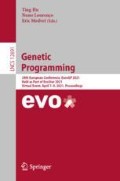Abstract
This work presents a novel genetic programming system for multi-class classification, called progressively insular cooperative genetic programming (PIC GP). Based on the idea that effective multiclass classification can be obtained by appropriately joining classifiers that are highly specialized on the single classes, PIC GP evolves, at the same time, two populations. The first population contains individuals called specialists, and each specialist is optimized on one specific target class. The second population contains higher-level individuals, called teams, that join specialists to obtain the final algorithm prediction. By means of three simple parameters, PIC GP can tune the amount of cooperation between specialists of different classes. The first part of the paper is dedicated to a study of the influence of these parameters on the evolution dynamics. The obtained results indicate that PIC GP achieves the best performance when the evolution begins with a high level of cooperation between specialists of different classes, and then this type of cooperation is progressively decreased, until only specialists of the same class can cooperate between each other. The last part of the work is dedicated to an experimental comparison between PIC GP and a set of state-of-the-art classification algorithms. The presented results indicate that PIC GP outperforms the majority of its competitors on the studied test problems.
Access this chapter
Tax calculation will be finalised at checkout
Purchases are for personal use only
References
Boucher, D.: Mutualism. Integr. Comp. Biol. 56(2), 365–367 (2016)
Wilson, D.S.: Structured demes and the evolution of group-advantageous traits. Am. Nat. 111(977), 157–185 (1977)
Muñoz, L., Silva, S., Trujillo, L.: M3GP – multiclass classification with GP. In: Machado, P., et al. (eds.) EuroGP 2015. LNCS, vol. 9025, pp. 78–91. Springer, Cham (2015). https://doi.org/10.1007/978-3-319-16501-1_7
Raymer, M.L., Punch, W.F., Goodman, E.D., Kuhn, L.A.: Genetic programming for improved data mining - application to the biochemistry of protein interactions. In: Genetic Programming 1996: Proceedings of the 1st Annual Conference, pp. 375–380. Morgan Kaufmann (1996)
Tan, X., Bhanu, B., Lin, Y.: Fingerprint classification based on learned features. IEEE Trans. Syst. Man Cybern. Part C (Appl. Rev.) 35(3), 287–300 (2005)
Al-Madi, N., Ludwig, S.A.: Improving genetic programming classification for binary and multiclass datasets. In: IEEE Symposium on Computational Intelligence and Data Mining (CIDM), pp. 166–173 (2013)
Koza, J.R.: Genetic Programming: On the Programming of Computers by Means of Natural Selection. MIT Press, Cambridge (1992)
Zhang, M., Smart, W.: Multiclass object classification using genetic programming. In: Raidl, G.R., et al. (eds.) EvoWorkshops 2004. LNCS, vol. 3005, pp. 369–378. Springer, Heidelberg (2004). https://doi.org/10.1007/978-3-540-24653-4_38
Zhang, M., Smart, W.: Using Gaussian distribution to construct fitness functions in genetic programming for multiclass object classification. Pattern Recogn. Lett. 27, 1266–1274 (2006)
Kishore, J.K., Patnaik, L.M., Mani, V., Agrawal, V.K.: Application of genetic programming for multicategory pattern classification. IEEE Trans. Evol. Comput. 4(3), 242–258 (2000)
Silva, S., Tseng, Y.-T.: Classification of seafloor habitats using genetic programming. In: Giacobini, M., et al. (eds.) EvoWorkshops 2008. LNCS, vol. 4974, pp. 315–324. Springer, Heidelberg (2008). https://doi.org/10.1007/978-3-540-78761-7_32
Lin, J.Y., Ke, H.R., Chien, B.C., Yang, W.P.: Designing a classifier by a layered multi-population genetic programming approach. Pattern Recogn. 40(8), 2211–2225 (2007)
Chen, Z., Lu, S.: A genetic programming approach for classification of textures based on wavelet analysis. In: 2007 IEEE International Symposium on Intelligent Signal Processing, pp. 1–6 (2007)
Smart, W., Zhang, M.: Using genetic programming for multiclass classification by simultaneously solving component binary classification problems. In: Keijzer, M., Tettamanzi, A., Collet, P., van Hemert, J., Tomassini, M. (eds.) EuroGP 2005. LNCS, vol. 3447, pp. 227–239. Springer, Heidelberg (2005). https://doi.org/10.1007/978-3-540-31989-4_20
Haynes, T., Sen, S., Schoenefeld, D., Wainwright, R.: Evolving a team. In: Working Notes for the AAAI Symposium on Genetic Programming (1995)
Haynes, T., Sen, S.: Crossover operators for evolving a team. In: Genetic Programming 1997: Proceedings of the Second Annual Conference (1997)
Brameier, M., Banzhaf, W.: Evolving teams of predictors with linear genetic programming. Genet. Program Evolvable Mach. 2, 381–407 (2001). https://doi.org/10.1023/A:1012978805372
Lichodzijewski, P., Heywood, M.I.: Managing team-based problem solving with symbiotic bid-based genetic programming. In: Proceedings of the 10th Annual Conference on Genetic and Evolutionary Computation, GECCO 2008, p. 363 (2008)
Soule, T., Komireddy, P.: Orthogonal evolution of teams: a class of algorithms for evolving teams with inversely correlated errors. In: Riolo, R., Soule, T., Worzel, B. (eds.) Genetic Programming Theory and Practice IV. GEVO, pp. 79–95. Springer, Boston (2007). https://doi.org/10.1007/978-0-387-49650-4_6
Thomason, R., Soule, T.: Novel ways of improving cooperation and performance in ensemble classifiers. In: Proceedings of the 9th Annual Conference on Genetic and Evolutionary Computation, GECCO 2007, p. 1708 (2007)
Luke, S., Spector, L.: Evolving teamwork and coordination with genetic programming. In: 1996 Proceedings of the Conference on Genetic Programming (GP 1996) (1996)
Soule, T.: Heterogeneity and specialization in evolving teams. In: Proceedings of the Genetic and Evolutionary Computation Conference (GECCO 2000) (2000)
Tsakonas, A.: A comparison of classification accuracy of four genetic programming-evolved intelligent structures. Inf. Sci. 176(6), 691–724 (2006)
Ionita, I., Ionita, L.: Prediction of thyroid disease using data mining techniques. Broad Res. Artif. Intell. Neurosci. 7(3), 115–124 (2016)
Zhang, C., Liu, C., Zhang, X., Almpanidis, G.: An up-to-date comparison of state-of-the-art classification algorithms. Expert Syst. Appl. 82, 128–150 (2017)
Acknowledgments
This work was partially supported by FCT, Portugal, through funding of projects BINDER (PTDC/CCI-INF/29168/2017) and AICE (DSAIPA/DS/0113/2019).
Author information
Authors and Affiliations
Corresponding authors
Editor information
Editors and Affiliations
Rights and permissions
Copyright information
© 2021 Springer Nature Switzerland AG
About this paper
Cite this paper
Brotto Rebuli, K., Vanneschi, L. (2021). Progressive Insular Cooperative GP. In: Hu, T., Lourenço, N., Medvet, E. (eds) Genetic Programming. EuroGP 2021. Lecture Notes in Computer Science(), vol 12691. Springer, Cham. https://doi.org/10.1007/978-3-030-72812-0_2
Download citation
DOI: https://doi.org/10.1007/978-3-030-72812-0_2
Published:
Publisher Name: Springer, Cham
Print ISBN: 978-3-030-72811-3
Online ISBN: 978-3-030-72812-0
eBook Packages: Computer ScienceComputer Science (R0)

